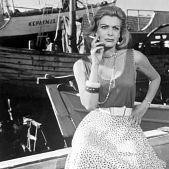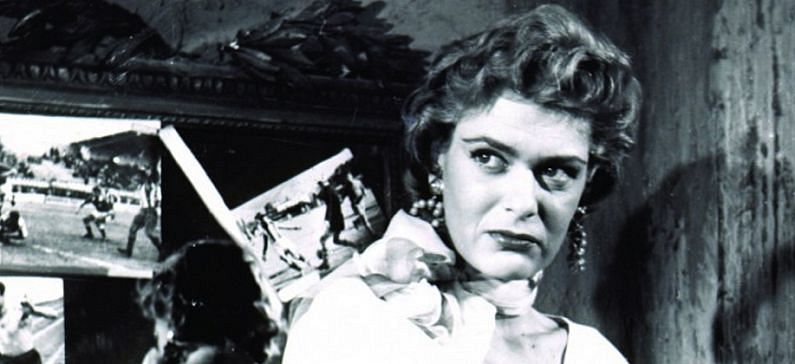
The woman who made history
Awarded artist, an active politician, in love with her country, a fascinating personality which created history both in our country and abroad. Melina Mercouri, who with her struggles and love for the nation and the culture of Greece, made the people worship her and managed even after 29 years to maintain a unique place in the heart and memories of the country.
The Mercouri family was of Arbanian origin, coming from Argolida and some of its members fought in the Revolution of 1821. Melina was born on October 18, 1920, at the home of her grandfather, Spyros Mercouris, Mayor of Athens for about twenty years, a house that was always open for anyone who wanted to visit.

The fact that Melina learned to engage with all kinds of people, from the most powerful to the most humble, combined with the love of Spyridon Mercouris for Athens and the close relationship they had, cultivated her education in human civilization, her communicative charisma, but also her own love for the Capital and Greece.
Her “hereditary” relationship with politics was not only due to the oldest Mercouris, as her father, Stamatis, was an officer of the Cavalry and served as MP and minister, while her uncle, George Mercouris, was the founder of the Greek National Socialist Party.

Melina was not a “child of letters”, she thought the lessons terribly dull and it was impossible for her to dedicate to reading. Instead, she daydreamed and wandered on her dreams of becoming an actor, which led her to read a lot about theater and history. It was, however, impossible to persuade her family of politicians to let her follow an acting career. Their social classes had other expectations, both from the side of her mother with an admiral and a diplomat for brothers and with her father in exile because he opposed Metaxa’s dictatorship.
In 1939, at the age of eighteen, she accepted to marry Panos Harokopos, financially powerful and, as a Cambridge graduate, a highly cultured and free spirit, because he accepted to let her study acting. They married secretly, without the consent of her family. They settled together in one of the most luxurious penthouses in the city and with the help of her friend, Dimitris Horn, she joined the Drama School of the National Theater.
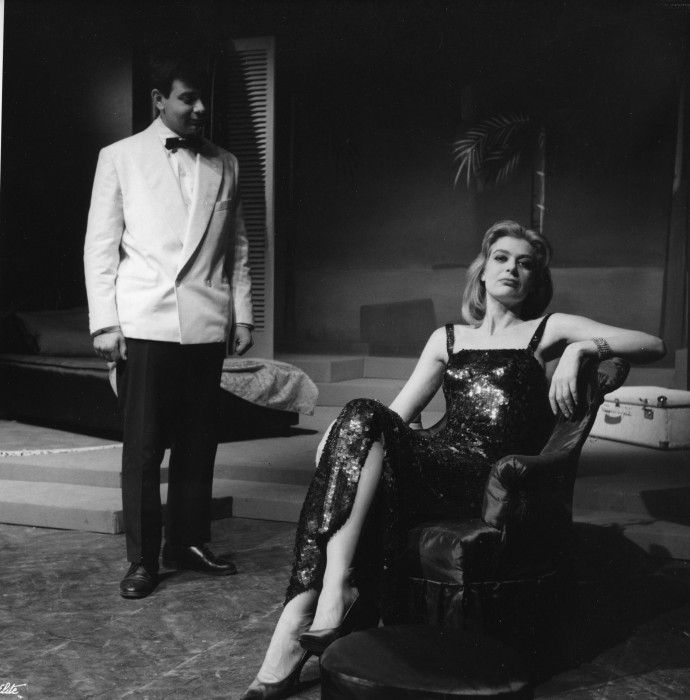
She first appeared on stage, in 1944, at the Britannia Theater, with the troupe of Giorgos Pappas and Antonis Giannidis, in the work of Alexis Solomos “The Path of Freedom” and continued with dozens of performances that made her stand out more and more in the eyes of the public and the critics. In 1949, “Bus of desire” was one of the milestone-performances in her career because the Art Theater of Karolos Koun was “forbidden” to the actors of the National Theater until then. “Anna of the Thousand Days” was a historical performance, directed by Dimitris Myrat and played among others by Melina Merkouri, Irene Pappa, Anna Synodinou, Nitsa Tsaganea, Christos Tsaganeas and others.
Since 1951, she began to star on the French stage as well, where he became the muse of one of the greatest playwrights, Marcel Asar. Her first film, the mythical “Stella”, was first screened in 1955. The direction of Michalis Cakogiannis, the script of Iakovos Kambanellis and Melina’s performance gave the film world recognition and was awarded the Best Retrospective Film Award at the Film Festival of Thessaloniki, 1960, with the Golden Globe of the Best Foreign Film of 1956, as well as the Isa Miranda Award for Melina Merkouri’s performance at the International Cannes Film Festival 1955.

In 1960, it was the landmark year for Melina Merkouri’s career, the year of the international triumph of “Never on Sunday” by Zil Dassen, movie which was awarded the Oscar of Best Song and, she, the Women’s Role Award at the Cannes Film Festival, the nomination for the Academy Award for Best Actress and was the starting point for her international career. The “Children of Piraeus” by Manos Hadjidakis, who, one year after taking the Oscar of Best Song, made bouzouki, the Greek music, the port of Piraeus, Greece as a whole famous, making it the most attractive tourist destination internationally. Melina went down to the Art Theater Underground and interpreted the deposed star, Alexandra del Lago, to Tennessee Williams’ “Sweet Bird of Youth”, which brought a burst of suggestions for film roles. She traveled to France and sometimes to Italy to take part in films by Claude Autant-Lara or Vittorio de Sica.
The most important American and European magazines sent their colleagues to photograph Melina in her hometown, and she put all her charm and elegance to advertise her homeland. More famous are Slim Aarons’ photos for a US magazine, in her most favorite neighborhood, Plaka. From that time on, she often appeared in photographs on the Acropolis, until the American channel ABC sent a crew in 1964 and turned Melina’s Greece. The music was by Stavros Xarchakos and he advertised Athens as well as many parts of Greece.
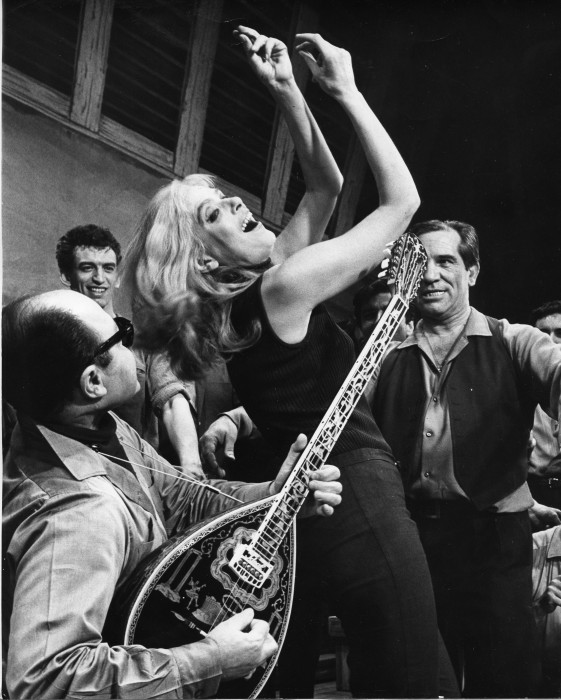
She and Zile Dessen married on May 18, 1966, in the Lausanne town hall, with Nikos Kourkoulos being the only Greek witness in marriage. “It is the happiest moment in my life,” said Melina Mercouri. “We would have married in Greece, but then we would have to call a lot of people and no noise and noisy would fit into a simple ceremony that marks a 10-year cohabitation.” The same evening followed a Greek feast with a syringe and a lot of fun in Lausanne Pallas.
In addition to her theatrical and cinematic career in Greece and abroad, Melina released more than fifteen albums, with works by Manos Hatzidakis, Mikis Theodorakis, Stavros Xarhakos, Yannis Markopoulos, Vassilis Tsitsanis, Kourt Vaill and Bertolt Brecht.

The coup d’état of April 21, 1967, happened while she was abroad, on Broadway performing in “Iliya Darling” and said crying to the American media “Please don’t go to my country.” Melina Mercouri had been deprived of her Greek citizenship and her Greek passport since the coup d’état due to her anti-dictatorial struggle. When informed of the decision of the junta, σhe made the historic statement “I was born Greek and I will die Greek. Patakos was born a fascist and will die a fascist. ”
With interviews, concerts, recordings, hunger strikes and political events, Melina was a permanent problem for the junta who attempted to murder her in various, unsuccessful ways, since the regime of the colonels described her as “foe of Greece ” and “enemy” of Greek tourism – a woman who had done everything for Greece and, with “Never on Sunday”, had contributed decisively to the country’s tourist boom. During the years of the dictatorship, from the moment she finished the performances of “Ilia Darling”, Melina played only “Lysistrata”, in 1972, in Broadway, directed by Michael Cacoyannis.
Two days after the return of Constantine Karamanlis, on July 26, 1974, she returned to her beloved Greece with a crowd of friends waiting for her at the airport. Two concerts were immediately organized, one by Mikis Theodorakis in Karaiskaki and the other by Markopoulos at the Panathinaikos stadium, which Nikos Koundouros included in his documentary “The Songs of Fire”. Melina, next to Xylouris, Dalaras, Katrakis, Loizos, Mariza Koch, Karezi and Kazakos, sang with her typically passionate voice the “Cloudy Sunday” by Tsitsanis, the “Caffe Hellas” by Markopoulos and two of Savvopoulos, “Karagiozis” and “Cyprus”.

In 1975, she directed the “Cent Opera” at the Kappa theater with Nikos Kourkoulos, in 1976, “Medea” with the National Theater and, in 1978, the “Companion to Brecht” by the Greek theater, Manos Katrakis, a performance for which Thanos Mikroutsikos wrote “Anna Do not Cry” to be sung by her and Yiannis Koutras. In 1980, she re-staged the “Sweet Bird of Youth” with Giannis Fertis and, essentially, ended her theatrical career with “Oresteia” at the Ancient Theater of Epidaurus by the Art Theater.
The assumption of power by the Pan-Hellenic Socialist Movement, after the results of the October of 1981 elections, was a re-start for Greece, Melina was placed by Prime Minister, Andreas Papandreou, in the leadership of the Ministry of Culture and did not lose her position until PASOK lost the rule of the country, in 1989. She returned in 1993 and maintained office until her early end.

Her subordinates, whom she called to “dream” with her since day one, learned through the years to love and appreciate her, although while the majority of them belonged to a political party other than that of the ruling party, she did not fire anyone. Thus, in addition to a good retirement, the civil servants of a colorless ministry learned and “dreamed” of new ways to improve culture and lead Greece into the international cultural map once again.
Politicians had commented that the Hellenic Ministry of Culture had never worked as successfully before. In addition, she wanted to know the issues of the people “from the inside”, so she opened her office once a week and people visited her and talked about what concerned them.
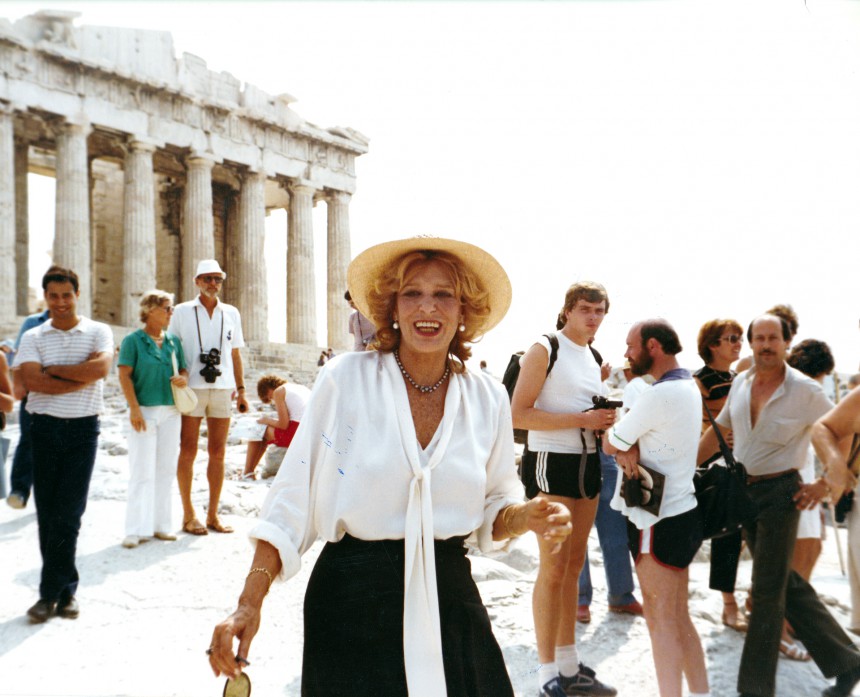
Melina Mercouri was the one who proclaimed that “the country’s heavy industry is culture” and fought to promote it both abroad and inside the borders of Greece. She had started the campaign for the return of the Parthenon Marbles, addressing the issue officially at the UNESCO International Conference of Culture Ministers in Mexico, in July 1982.
“You have to understand what the Parthenon Marbles mean to us. They are our pride. They are our sacrifices. They’re the supreme symbol of courtesy. They’re a tribute to democratic philosophy. They’re our ambition and name. They’re the essence of our Greekness,” she said, adding: “If you ask me if I live when the Parthenon Marbles return to Greece, I tell you that yes, I will live. But even if I don’t live anymore, I will be reborn. ”
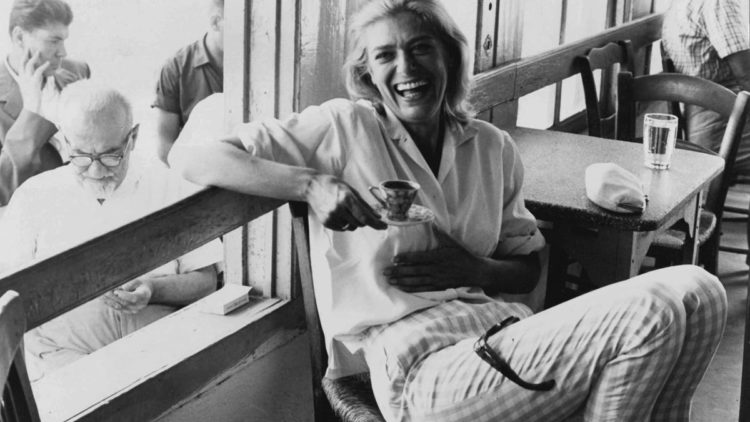
In order to make it possible for the Marbles to return, in 1989, she launched a competition for the construction of a new Acropolis Museum, while giving emphasis to the restoration work of the Acropolis and the preservation of our cultural heritage. Also, the unification of the historic center of Athens for the creation of an archaeological park was her idea. “It is imperative that it is Greece’s duty to preserve the heart of its history, the heart of Athens, its historical center, with a project that will completely change the image and life in the center of the city,” she said.
In 1983, she made the question “how is it possible for a community that lacks its cultural dimension to develop?” Before the ministers of culture of the then EEC, noting that culture “is the soul of society” and that the European identity “lays on respecting diversity and creating a living example through a dialogue of Europe’s cultures. It is time for our voice to be heard with the same power as the technocrats’. Culture, art and creation are no less important than trade, economics, technology. ”

PASOK was out of power for three years, and when she returned to government, in 1993, Melina, in light of her serious lung cancer health problems, took over again her favorite ministry, in collaboration with Thanos Mikroutsikos. According to her statements, she looked at her illness straight in the eye. Indeed, there was a period when every morning, before her office, she went for chemotherapy, just as 357 prints, TV channels and radios from around the world demanded an interview with her.
The day before traveling to New York to operate, she went to the ministry to bid farewell to her loved ones, and while she said goodbye and left them, she returned a few minutes later, went back to her office without talking to anyone, winded a small barrel organ that Tsarouchis had given her up and left with the tune of “Children of Piraeus”.
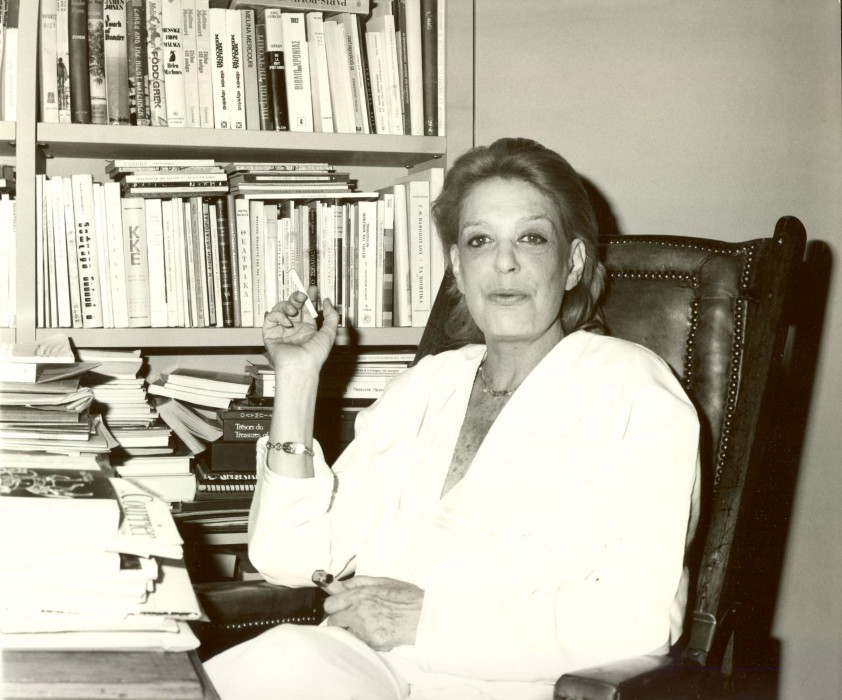
In the news of her death on March 6, 1994, the international press made detailed tributes to the life of the mythical Greek woman with the thunderous laughter, while in Broadway the theaters were closed at the time of the funeral. The pilgrimage of the thousands of Athenians who passed through the chapel of the Metropolis to say their last goodbye lasted for eighty-four hours, and on March 10, after the funeral ceremony, many Athenians accompanied her until her last home in the First Cemetery of Athens.
She was the first woman in Greece to be buried after a three-day national mourning, with the honors of a prime minister. It was the largest in volume and emotion funeral that Athens has ever seen, surpassing even those of the most prominent personalities.





